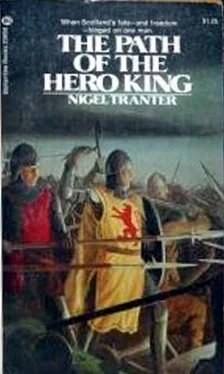It was in such frame of mind that Bruce and his companions, after a long day trying to lick into shape the heterogeneous collection of volunteers, lounged in the Lady Christians apple-orchard, when the lookout from the towers parapet shouted that ships were appearing from around the Heads of Ayr to the south, many ships. Cursing, all lethargy banished in an instant, the King was up and running for the tower-door. This had been one of his fears-that King Edward might send up relief and reinforcements by sea to his beleaguered minions at Aye. His bastard, Sir John de Botetourt, it was said, had developed a taste for seafaring, these days, and had earlier been savaging the Clyde ports and havens in a campaign of sheer piracy and plunder-a truer son of his father than was Edward, Prince of Wales.
When Bruce reached the high parapet, however, with the watch shouting that it was a great fleet, it was to know something of relief, at any rate.
Those are galleys, man! he cried.
Highland galleys-not English ships.
The watch, who had not said that they were English, wisely held his peace.
The Kings relief was only partial. There were fully twenty large galleys out there, their hundreds of oars flashing with rhythmic motion as they caught the light of the sinking sun. Whose they were was not apparent. Not many Highland chiefs could muster such a fleet-but two who could were MacDougall of Lorn and the Earl of Ross.
Then, as the leading vessels turned directly into the bay, and their
great square sails bellied to the westerly breeze, the vivid emblem of
the Black Galley of the Isles stood out clear on each, un differenced unmistakable.
Angus Og! Bruce exclaimed.
Thank God it is he! Whatever may bring him here. Jamie! Neil! Down to the boat-strand with you. To wave them in. In case they make for the harbour. Take my. banner. The English still held Ayrs harbour, dominated by the castle.
If it is Angus Og himself, pay him all respect. And bid him here, to me.
So presently, heralded by the shrill music of strutting, blowing pipers, a colourful company came up the north side of the River Ayr, across the water from the town proper, ken speckle in saffrons and tartans, horned helmets and eagles feathers, piebald calfskins and gleaming Celtic jewellery. Bruce awaited them before his cousins gatehouse.
Angus Og, in full war panoply, and flanked by an almost overwhelming phalanx of chieftains in barbaric splendour, stalked in front-and he at least was smiling.
As they came up, James Douglas at his side, raised hand and voice.
Sire-here is the noble Angus Og MacDonald, Lord of the Isles…
His words were drowned in the blast of a horn, and a much more powerful voice followed it, to shout Angus, son of Angus son of Ranald, son of Somerled the Great, of Islay, King of the Isles and Lord of Kintyre. To Robert, King of Scots, greeting!
Bruce swallowed. So they were back to that, again! But he smiled also-and when Robert Bruce smiled, the stern graven lines, in which his features had set these days, were transformed quite. He stepped forward, hands out.
My lord and good friend Angus! he said.
I rejoice to sec you.
The other came to meet him, and they gripped hands and clasped shoulders, as equals and comrades-in-arms rather than as monarch and subject.
I salute you, King Robert, he returned.
Here is a day to remember. Seannachies will sing of it.
You say so? Bruce blinked.
Then I am glad. You have brought news?
I have brought myself, and mine. That was simply said.. News enough, I would think.
Mmm. Yes. To be sure. And you are welcome, my lord. All of you.
Angus Og did not actually frown, but his open boyish though swarthy face stiffened.
I am glad that I am welcome, sir. I had not expected otherwise, with one thousand broadswords!
I faith-you mean…?
I mean, Sir Robert, that I am come to make cause with you.
Against our enemies. With a score of galleys, two score chieftains and a thousand men. Straight from Ireland I have come.
By the Rude-do I hear aright? The King did not attempt to hide his surprise.
You have come to fight? Angus of the Isles joins my host…?
He comes to aid your host, shall we say?
The other was not concerned to split hairs over the definition, there and then. He gripped the Highlanders arm.
Here is a great, notable day indeed. You have changed your mind, my friend, since that day at Rathlin Island?
You have changed it for me, Sir King. At Rathlin, I said that I would war with Edward of England for-my own hand and in my own time. Your cause was scarcely hopeful. You have made it otherwise, these last months. The Glens of Antrim are not so far away that I have not heard of your doings. I have come to make your war mine. I have matters to settle with the English and their friends, over that sorry business at Stranraer. When your brothers were defeated. Many of the men slain then were mine, hired to you. Murdered, after the battle. And my friend, Malcolm MacQuillan, Prince of Antrim, beheaded. We can settle these scores together, you and I.
So-0-0! Here then is the most sure sign of belief in my final victory, I swear! Of any I have received. That Angus Og should deem it prudent, worth his while to support me!
If the Islesman sensed criticism in that, he did not say so.
Even so, it could be that I erred. Deemed wrongly, he said.
You are going to need my support sooner than I thought. As we came up the firth we spied and ran down an English craft, making for Wigtown Bay and the Cree. It bore couriers. Edward the King marches. Edward is on his way.
What!
We took his messengers. With orders for Pembroke, Botetourt and the rest. Edward has risen from his sickbed. He has given his travelling-litter to the cathedral at Carlisle, as a thank-offering for recovery, and mounted his war-horse again. He leads a host of 200,000, for the Border. To wipe Robert Bruce off the face of this Scotland!
Stricken to silence, the King looked at him.
I near thought again, as to joining you, then, Angus Og added, grimly.
But here I am.
He is on his way? Now? He could be in Scotland by this?
Scarce so fast. It was at noon today we took his vessel. It had
sailed from the port of Silloth only at first light. Edward was then making for the fords of Solway.
Then we have a little time. To get away from Ayr. Into the high hills. It is back to the mountains with us. But tomorrows dawn will serve. I will give orders for all to be ready to move with daylight. To a place where Edward cannot reach us. Gods curse on the man-his spleen is as good as life to him! Will I never be free from his malice?
The other shrugged.
He will die one day.
His body, yes. But will his hate? Such all-consuming bitterness?
Bruce drew himself up.
But, my sorrow that I should hold you standing here, my lord. You and yours. Come-this is my cousins house. But she keeps a good table. Tonight we can still take our ease. And tomorrow, march. What will you do with your galleys, friend?
Send them across to the Isle of Bute. To the old Steward, at Rothesay. They can await my summons there …
It was two weeks later, in the lofty lonely hills around Loch Doon again, on the Galloway border, before Bruce gained sure news of Edward, news that he could trust. Every spy and scout reported tales and rumours, not only his own but his various commanders scouts-for the Scots host was now split up, inevitably, since none of these high narrow valleys could contain and support large numbers, and the royal force now totalled nearly 4,000. The tales said that King Edward was here, or there, making for the East March, or Edinburgh, or Galloway, or even returned to Carlisle.
Читать дальше












